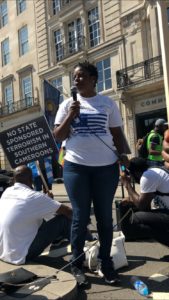The Foumban Constitutional Conference of 1961 was not properly coordinated because the Southern Cameroons delegation had no constitutional powers to adequately discuss about relations with a third party. At this time, the Southern Cameroons had a constitution passed by the British Parliament on 1st October 1960 known as ‘Southern Cameroons Order-in-Council’ which was a British Colonial Law. This led to the creation of a Ministerial Government in Southern Cameroons with Capital in Buea and John Ngu Foncha as Prime Minister taking effect on the 1st October 1960 which is a day Southern Cameroons consider as Independence Day. On this day the British also ceased to govern the territory through the British Governor General of Nigeria.
The 1960 ‘Southern Cameroon’s Order in Council’ could not continue to administer Southern Cameroons as it was no longer effective. Hence, powers were given back to the British Government in London who assigned an expatriate Colonial Officer known as Commissioner for Cameroons representing the British government in Buea. The British then governed Southern Cameroons as a Trust Territory until September 1961 when the British Trust mandate over the territory expired.
The Foumban Constitutional Conference of 1961 brought no gains to the people of Southern Cameroons. The conference failed to achieve its objectives which were to establish a unique Federation of two states equal in status on the continent of Africa and secondly to evolve a bicultural society in which the distinct heritage of each of the parties to the union would flourish. The Foumban Conference was therefore the beginning of the untold misery of the People of Southern Cameroons Ambazonia. In fact, instead of containing a unique federation in the two Cameroons, the Southern Cameroons has become a People with numerous problems. The destruction of the Federal system of 1961 in 1972 by the then President Amadou Ahidjo was a gross violation of the 1961 constitution.
The negotiations at the Foumban Conference were false and just for the benefit of one party present since there was no proper preparation for the discussions at the conference to have a positive effect on Southern Cameroons. Secondly British Southern Cameroons engaged in the discussions at the conference without any intention of reaching any agreement. But French Cameroon came in with an already prepared constitution for self-governance.
Perhaps, the British Southern Cameroons since the Foumban conference has been largely silenced by the power of the present Nation-state of Cameroon. As a result, there will always be conflict until Southern Cameroons gets its Independence restored as voted for in UNGA Resolution 1608 (XV) of 21st April 1961. The symbolic restoration of the Independence of Southern Cameroons Ambazonia was announced on 1st October 2017 by our interim President Ayuk Julius Tabe. It’s the duty of the UN to admit Ambazonia as its newest member and call on negotiations to begin between La Republique du Cameroun and Ambazonia for a peaceful separation. Ambazonia must be free.
By Anumboh Eveline Mafor
SCNC-UK ACTIVIST

